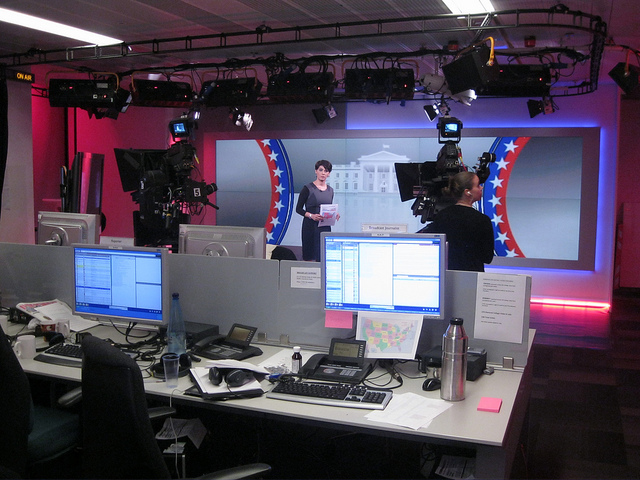Competitive elections are good democracy, creating more engaged voters over a longer period of time
The closer the election, the better for democracy. At least, that is the conclusion of research carried out by Heather Evans. She finds that a close election, and all of the resulting attention that ensues, makes voters more politically engaged, a change which continues into the next election cycle. She additionally argues that this insight should be part of any future debate on how to increase engagement with democracy.
Credit: Stuart Pinfold, CC BY NC ND 2.0
Two of the hallmarks of democracy, political knowledge and political interest, regularly come under fire from pundits and lawmakers. As pointed out in a recent study from Pew Research, only about 40% of Americans can correctly identify the majority party in the U.S. House and Senate. Research by the Hansard Society also shows that less than one-third of those in the U.K. confess an interest in “politics.”
Can anything be done to improve citizens’ political knowledge and interest? In a recent post, Caitlin Milazzo shows that citizens living in marginal seat races are more knowledgeable. While that is good news for democracy, recent research shows that not only do those exposed to competitive elections become more politically knowledgeable and interested, but the effect lasts for at least a year after the election is over. In a recent paper in the Journal of Elections, Public Opinion and Parties, I along with my two co-authors (Michael J. Ensley and Edward G. Carmines) find that competitive elections are not only good for democracy, but that their effects last.
Given the increase in campaign spending, television coverage, and party involvement in competitive races, it is no surprise that research has found that citizens exposed to those races have higher levels of political knowledge. While many scholars spend time focusing on the effects such races have on public opinion, up until this point these researchers have used surveys that are collected either directly before or after an election is over. While this gives us information about the effects of competition during the election season itself, we know very little about the effects of elections after the races are over.
In our study, we test for a lasting effect of competition. Analyzing a survey of citizens conducted one year after the 2006 Midterm Elections that includes an oversample of individuals from competitive districts, we show that competitive elections increase voters’ political knowledge (of Congress generally and of their representative) and political interest.
Our results show that those who reside in a House district that had a competitive race in 2006 had higher political engagement a year later. Those living in what were competitive districts were significantly more likely to answer correctly objective questions about how Congress works and also reported more interest in political affairs and said they consumed more political news.
We argue that the reason citizens have low levels of knowledge about Congress may be the lack of competitive districts. The number of competitive races in the U.S. has been declining over time. Since so many districts are uncompetitive, this possible source of learning is going unexploited. One way we might consider increasing low levels of knowledge and interest is to create more competitive districts during the redistricting process. Our research suggests that competition has an important effect on learning and engagement, and must be part of any discussion on how to enhance democracy.
—
Note: this post represents the views of the author and not those of Democratic Audit or the LSE. Please read our comments policy before posting. The shortened URL for this post is: https://buff.ly/1qZmale
—
 Heather Evans is an Assistant Professor in the Department of Political Science at Sam Houston State University. Her primary research interests are political participation and behavior, public opinion, competitive elections, media and politics, the status of women in the political science discipline, and political psychology. Her book, “Competitive Elections and Democracy in America: The Good, the Bad, and the Ugly”, was just published by Routledge in November 2013.
Heather Evans is an Assistant Professor in the Department of Political Science at Sam Houston State University. Her primary research interests are political participation and behavior, public opinion, competitive elections, media and politics, the status of women in the political science discipline, and political psychology. Her book, “Competitive Elections and Democracy in America: The Good, the Bad, and the Ugly”, was just published by Routledge in November 2013.






 Democratic Audit's core funding is provided by the Joseph Rowntree Charitable Trust. Additional funding is provided by the London School of Economics.
Democratic Audit's core funding is provided by the Joseph Rowntree Charitable Trust. Additional funding is provided by the London School of Economics.
“Competitive elections are good for democracy, creating more engaged voters https://t.co/bIttnuIOCt” interesting read
“@PJDunleavy: Competitive elections are good democracy, creating more engaged voters over a longer period of time https://t.co/HYYz94p8pE” PR
Competitive elections are good democracy-creating more engaged voters over a longer period of time- Heather Evans https://t.co/C8UFZRMvfM
Competitive elections are good democracy, creating more engaged voters over a longer period of time https://t.co/UvVfzpr1LG
Competitive elections are good democracy, creating more engaged voters over a longer period of time https://t.co/f5xhq3IpFA